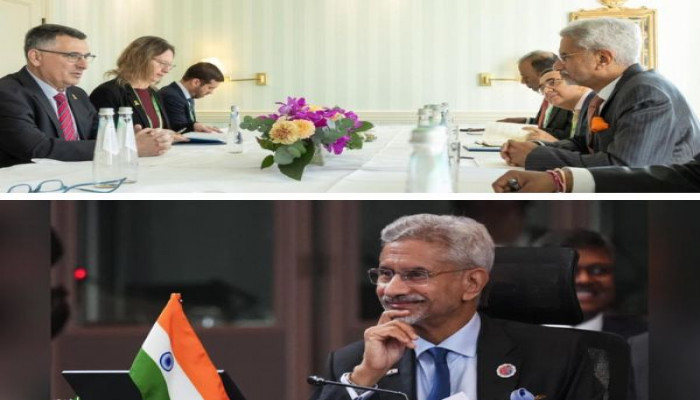EAM Jaishankar and Israel’s Gideon Sa’ar hold talks on trade and terrorism
- In Reports
- 07:40 PM, Nov 04, 2025
- Myind Staff
India and Israel on Tuesday held detailed talks on fighting terrorism and agreed that the world must adopt a zero tolerance approach to it. The two countries also discussed ways to deepen their partnership in trade, infrastructure and regional connectivity through projects such as the India Middle East Europe Economic Corridor known as IMEC.
The meeting between Israeli foreign minister Gideon Sa’ar and external affairs minister S Jaishankar also discussed the situation in Gaza and the US-brokered peace plan. Jaishankar said that India continues to support the peace process, hoping it will bring a “durable and lasting solution”.
This is Sa’ar’s first trip to India, making him the fifth Israeli minister to visit the country. According to people familiar with the matter, these visits have prepared the ground for a possible trip by Prime Minister Benjamin Netanyahu in the near future.
Jaishankar noted that both countries face the same challenge of terrorism and said, “It is essential that we work towards ensuring a global approach of zero tolerance towards terrorism, in all its forms and manifestations.” Sa’ar called “radical terror” a common threat and recalled Israel’s condemnation of the terror attack in Pahalgam in April.
Sa’ar said that Israel is confronting the “radical terror states” of Hamas in Gaza, Hezbollah in Lebanon and Houthis in Yemen, adding that defeating them is crucial for peace and security in the region. “The eradication of Hamas’ terrorist state is at the heart of President [Donald] Trump’s plan. Hamas must be disarmed, Gaza must be demilitarised. We will not compromise on it,” he said.
Last month, Israel and Hamas agreed to the first phase of a US-backed 20-point peace plan. It included a ceasefire in Gaza and the release of Israeli captives and Palestinian prisoners. The deal ended the fighting that began after Hamas’ terror attacks on Israel in October 2023, which killed 1,200 people. Over the past two years, more than 67,000 Palestinians, including 20,000 children, have been killed in Israeli offensives.
Sa’ar also remembered Prime Minister Narendra Modi’s gesture of support and said, “We remember he was the first world leader to call Prime Minister Netanyahu after Hamas’ October 7 massacre, and we won’t forget it.”
Jaishankar said that India and Israel share a strategic partnership built on a “real meaning”. He added that both countries have stood together in difficult moments and created a relationship based on a “high degree of trust and of reliability”. India, he said, welcomes the return of Israeli hostages and the remains of those killed in Hamas’ attacks and supports the Gaza peace plan, hoping it “paves the way for a durable and lasting solution”.
Both sides also explored ways to deepen cooperation in trade, innovation, professional mobility and connectivity. A bilateral investment agreement was signed earlier this year by finance minister Nirmala Sitharaman and her Israeli counterpart Bezalel Smotrich during his visit to India in September.
Jaishankar spoke about India’s growing strengths in rail, road and port infrastructure, renewable energy and healthcare, and said Indian companies are eager to explore opportunities in Israel. He added that both sides can work together more closely in agriculture, innovation, semiconductors and cyber issues. He also said that India looks forward to Israel’s participation in the AI Impact Summit next February.
“Indian workers are…present in Israel in growing numbers as a result of our mobility understandings. They have some issues which need attention and I hope that we can take that dimension of our ties forward,” Jaishankar said without sharing details.
Israel is now home to around 40,000 Indian workers. Over the past two years, Israel has stepped up hiring of Indians as caregivers and construction workers to replace Palestinian labour.
The two ministers also spoke about regional and multilateral cooperation. Sa’ar said that Israel supports projects like I2U2 and IMEC. “We want to promote connectivity between South Asia, West Asia and Europe,” he said, describing India as the fastest growing economy and Israel as a regional powerhouse.







Comments